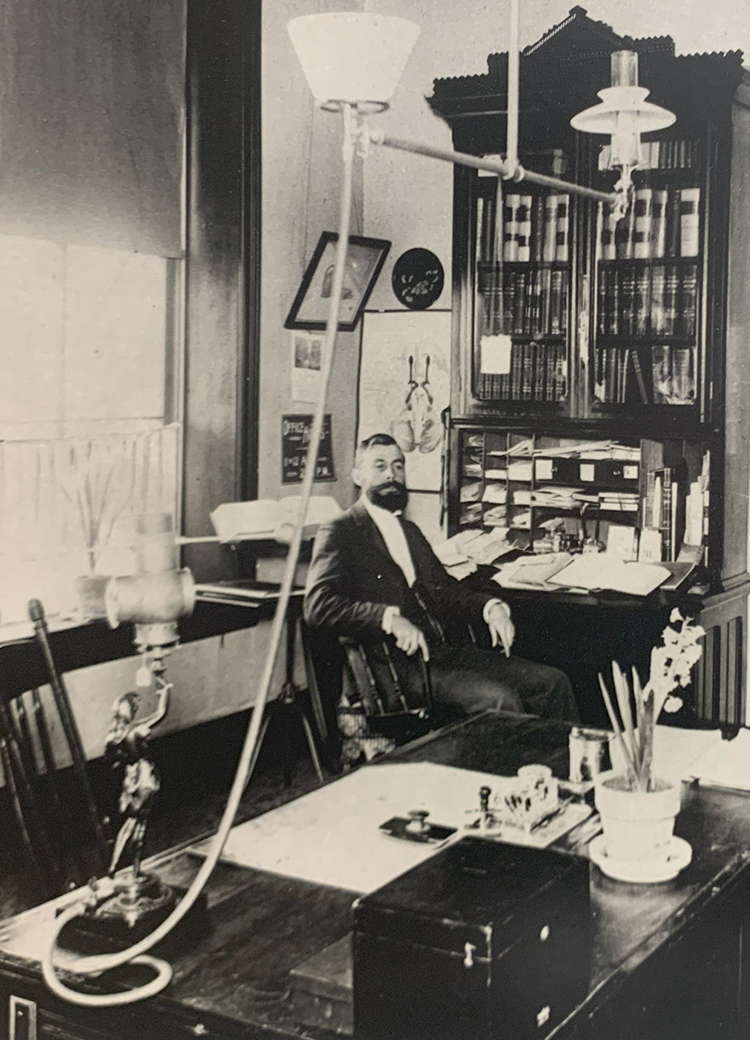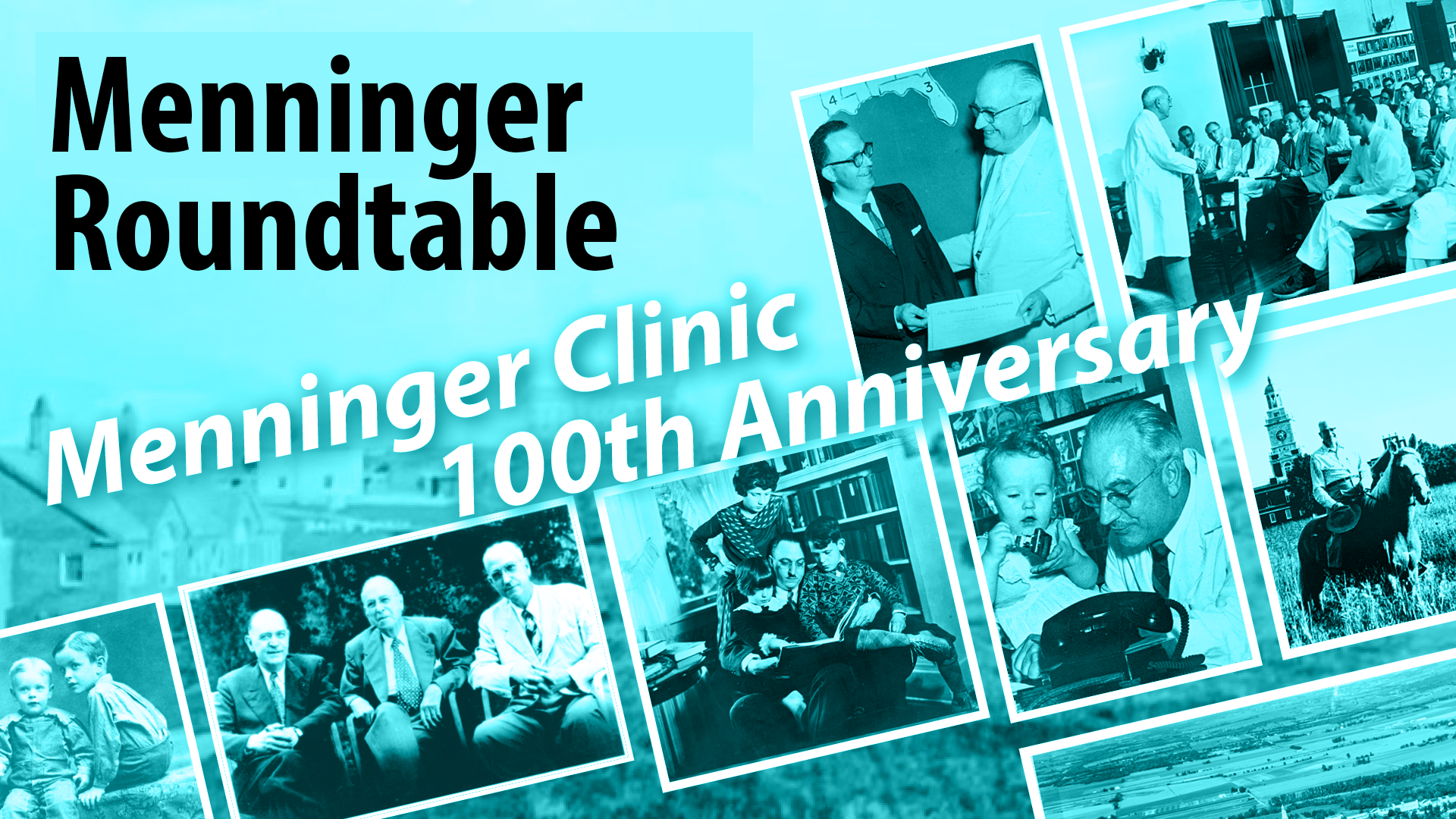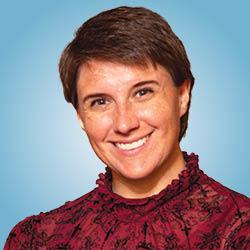Freud and Friendliness: Menninger at 100
"Freud and Friendliness": Menninger at 100
In 2025 the world-renowned Menninger Clinic will celebrate its 100th anniversary. The clinic (often called simply “Menningers”) started in an unassuming farmhouse on the outskirts of Topeka, but soon grew to become the nation’s top psychiatric facility. Those who worked at Menningers were pioneers in a new, integrated approach to mental health treatment. Their efforts made Topeka the hub for psychiatric treatment, research and training for more than 70 years.
Horse & buggy beginnings
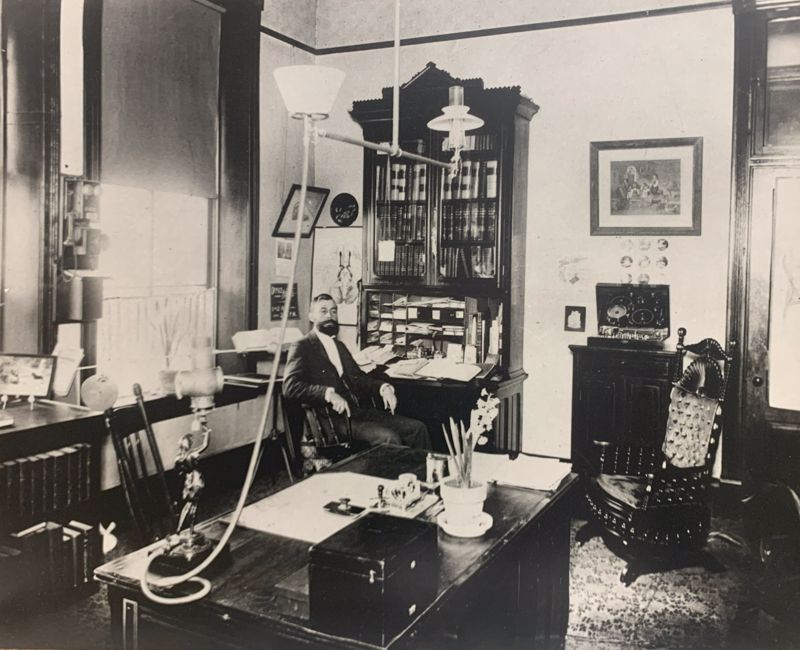 Dr. C.F. Menninger in his offices at 727 S. Kansas Ave. (TSCPL)
Dr. C.F. Menninger in his offices at 727 S. Kansas Ave. (TSCPL)
The history of the Menninger family in Topeka begins in 1889, when the newly minted Dr. Charles Frederick (C.F.) Menninger and his wife, Flo, moved to the capital city so he could establish a medical practice. He rented office space in the Davies building at 727 S. Kansas Avenue and soon became the favored doctor for many Topekans, especially German immigrants.
C.F. and Flo had three sons: Karl, Edwin and William. Both parents expected their boys to be studious and well-rounded. Edwin later recalled that he and his brothers were “required to put in an hour’s practice on our various musical instruments between 6 and 7am.” The boys also accompanied C.F. on house calls, which he did as many as 35 times a day. While the doctor was seeing his patients, the boys were expected to stay with buggy, a process they called “holding the horse.” It’s little wonder that all three developed an interest in medicine.
Family practice
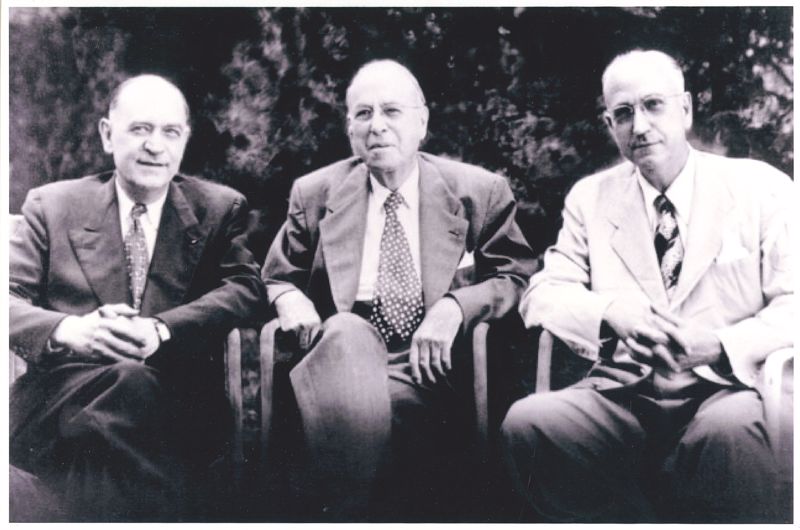 From left to right: Dr. William Menninger, Edwin Menninger and Dr. Karl Menninger (TSCPL)
From left to right: Dr. William Menninger, Edwin Menninger and Dr. Karl Menninger (TSCPL)
C.F.’s goal had always been to work with other practitioners to “share ideas, help and support each other when difficult decisions had to be made in the care of patients.” In 1919 his eldest son Karl returned to Topeka, after receiving his medical degree from Harvard Medical School. Karl developed an interest in psychology when he served his residency at the Boston Psychopathic Hospital. He and his father founded the Menninger Diagnostic Clinic. A few years later, after receiving his M.D., William (Will) joined his father and brother at the clinic.
In 1925 the Menningers expanded their practice with the purchase of a farmhouse at 3535 SW 6th Ave, which was outside the city limits at the time. This became the first Menninger Clinic and Sanitarium and was the first group psychiatry practice in the United States. By February 1926 the building was occupied by 14 patients, which was its maximum capacity. During the next several years, the clinic and sanitarium expanded to become a large campus that occupied most of the space on 6th Ave between Gage and Watson.
Many were attracted to Menningers due to their practice of “dynamic psychiatry.” Patients there were not seen as “cases” but as individuals requiring treatment. Instead of isolating patients from their families and society at large, the doctors at Menningers involved family in as many steps of treatment as possible. The main goal was for the patient to be able to return to society as Dr. Karl put it, “weller than well.”
Beyond treatment
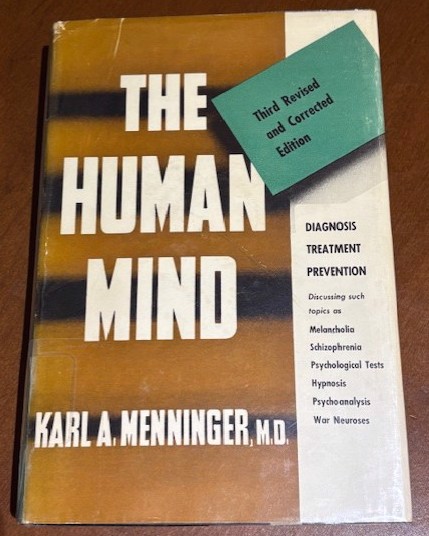 Dr. Karl Menninger's first book, "The Human Mind," became a bestseller (TSCPL)
Dr. Karl Menninger's first book, "The Human Mind," became a bestseller (TSCPL)
When Menningers began, psychiatry was still a relatively unknown discipline. Karl hoped to change the public’s perception of the mentally ill by writing articles and books meant for the layperson. In 1930 he published his first book, The Human Mind, which became a bestseller. He also published articles in Ladies Home Journal and had a regular advice column in the magazine.
In 1941 the family established the Menninger Foundation as the nonprofit arm of their operations. As the clinic and the other branches at Menningers began to rely more and more on grant money, the Foundation was created to help get the money where it needed to go more quickly.
Will was also integral in raising awareness of mental health treatments. During World War II he was named chief psychiatric consultant to the U.S. Surgeon General. By the end of the war he had obtained the rank of Brigadier General, the highest rank a psychiatrist had been named to up to that point.
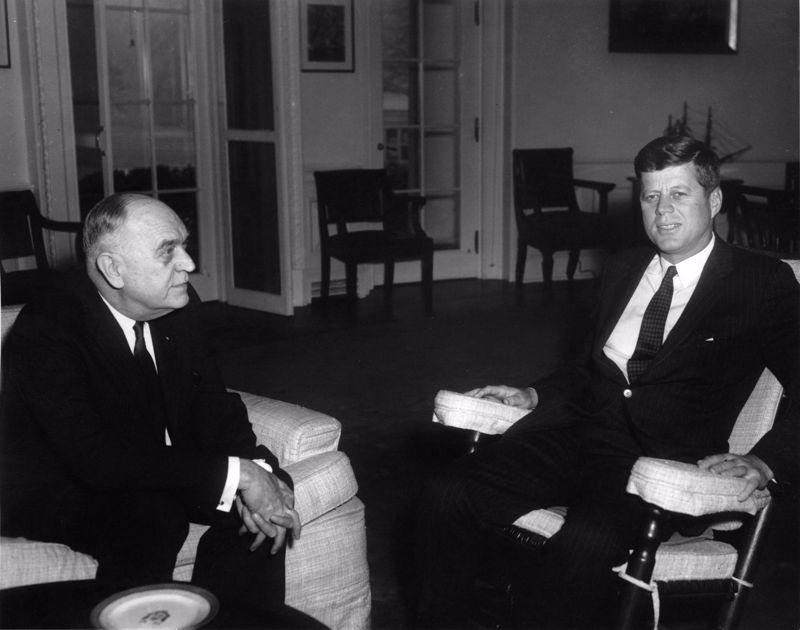 Dr. William Menninger meeting with President John F. Kennedy (Abbie Rowe. White House Photographs. John F. Kennedy Presidential Library and Museum, Boston)
Dr. William Menninger meeting with President John F. Kennedy (Abbie Rowe. White House Photographs. John F. Kennedy Presidential Library and Museum, Boston)
Will’s contacts in the armed forces talked to him about the need for more psychiatrists to deal with those returning from the war with “battle fatigue,” which today is known as PTSD. Thus began the Menninger School of Psychiatry, later renamed the Karl Menninger School of Psychiatry and Mental Health Services. It quickly became the largest training center in the world.
On the hill
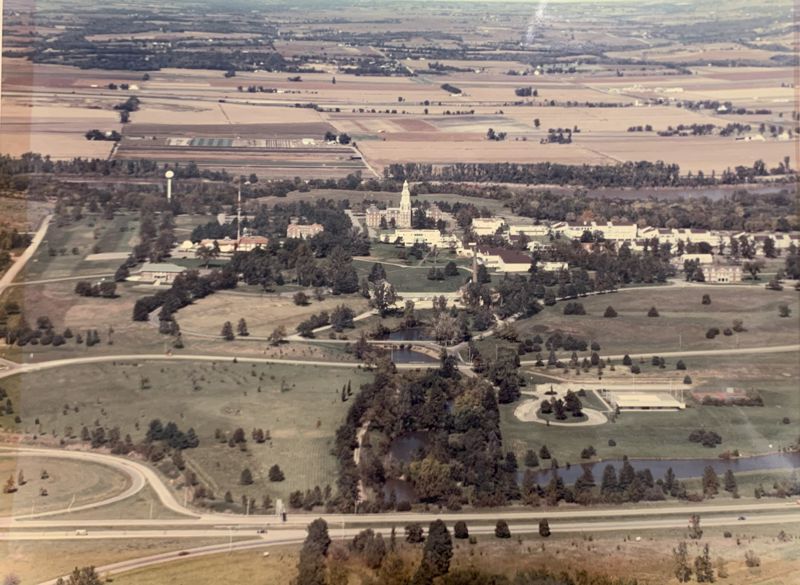 An aerial view of the Menninger Foundation's west campus (TSCPL)
An aerial view of the Menninger Foundation's west campus (TSCPL)
In 1954 Menningers expanded its operation when it began leasing 40 acres on Martin’s Hill west of Topeka. The hill had formerly been home to the Security Benefit Association hospital. At first, the west campus (as it came to be known) housed staff offices and was home to programs such as industrial mental health, marriage counseling service, and religion and psychiatry. Eventually Menningers purchased the entire 373-acre site and moved all its operations to the hill.
Between the mid-1950s and mid-1960s, the third generation of Menninger doctors joined the family business. Dr. Karl’s son, Robert, received his medical degree from the University of Rochester School of Medicine and came back to Topeka to do his residency at the Menninger School of Psychiatry. He later became the director of the Museum and Archives program at Menningers.
Two of Dr. Will’s sons, Roy and Walter, became psychiatrists and worked their way up through the Menningers’ hierarchy. Dr. Roy Menninger eventually became the Foundation’s president and CEO after the death of his father in 1967. He served in that position until his retirement in 1993. Dr. Walter Menninger served as the Dean of the Menninger School of Psychiatry and took over as president and CEO of the Foundation after his brother’s retirement, serving in that position until 2001.
By the 1980s Topeka was known as the psychiatric center of the world and Menningers had a world-wide reputation as the place to go for mental health treatment and training. Menningers had a contract with the NFL to provide care for its players. Members of the rich and famous from New York and California traveled to Topeka seeking the help of the Menninger doctors.
The parting of ways
 Headline of the Topeka Capital-Journal, September 28, 2000 (TSCPL)
Headline of the Topeka Capital-Journal, September 28, 2000 (TSCPL)
Unfortunately the 1990s saw a change in the way insurance companies dealt with mental health treatment. They no longer paid for long-term care such as that being done at Menningers. Rising operational costs meant the Menninger Foundation was losing money.
In September 2000 the Menninger Foundation announced it would be leaving Topeka and moving to Houston, Texas, to partner with the Baylor College of Medicine. To maintain the “Menninger spirit” that had been cultivated in Kansas, many of the employees moved to Houston as well. In May 2003 the last patient left the Topeka campus and the Menninger Foundation closed its doors.
Today many of the old buildings on the Menninger campus are still vacant or have been demolished. In 2013 the Sunflower Foundation purchased 13 acres on the hill that encompassed the old nurses’ dormitory and the powerhouse and converted the two buildings into their new offices and nonprofit center. The clock tower, which has long been a well-known feature of the Topeka skyline, was recently purchased by a developer. Its fate is unknown.













